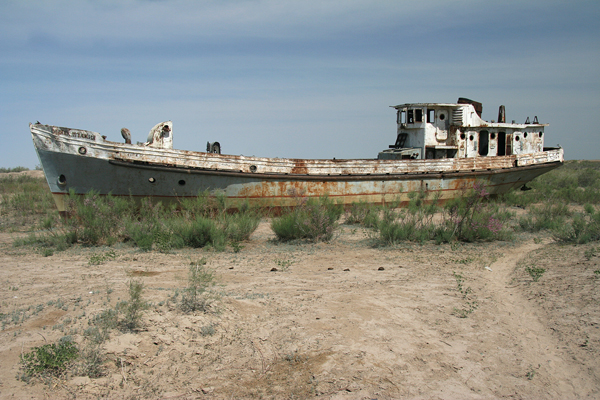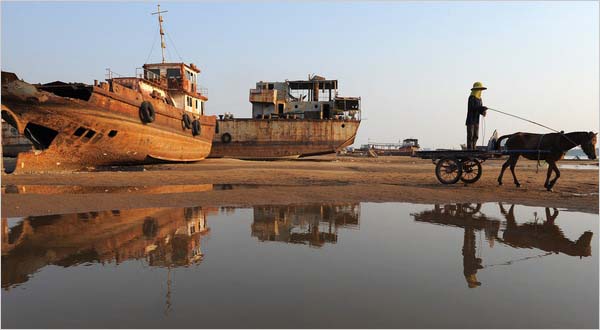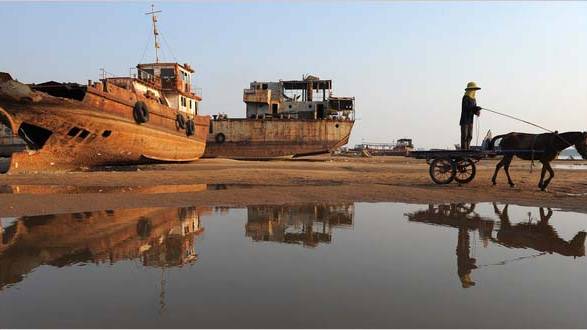"Shocking Disaster" - Aral Sea Dried Up
Source: ca.news.yahoo.com
The drying up of the Aral Sea is one of the planet’s most shocking environmental disasters, U.N. Secretary-General Ban Ki-moon said as he urged Central Asian leaders to step up efforts to solve the problem.
Once the world’s fourth-largest lake, the sea has shrunk by 90 per cent since the rivers that feed it were largely diverted in a Soviet project to boost cotton production in the arid region.
The shrunken sea has ruined the once-robust fishing economy and left fishing trawlers stranded in sandy wastelands, leaning over as if they dropped from the air. The sea’s evaporation has left layers of highly salted sand, which winds can carry as far away as Scandinavia and Japan, and which plague local people with health troubles.
Ban toured the sea by helicopter Sunday as part of a visit to the five countries of former Soviet Central Asia. His trip included a touchdown in Muynak, Uzbekistan, a town once on the shore where a pier stretches eerily over grey desert and camels stand near the hulks of stranded ships.
"On the pier, I wasn’t seeing anything, I could see only a graveyard of ships," Ban told reporters after arriving in Nukus, the nearest sizable city and capital of the autonomous Karakalpak region.
"It is clearly one of the worst disasters, environmental disasters of the world. I was so shocked," he said.
The Aral Sea catastrophe is one of Ban’s top concerns on his six-day trip through the region and he is calling on the countries’ leaders to set aside rivalries to co-operate on repairing some of the damage.
"I urge all the leaders ... to sit down together and try to find the solutions," he said, promising United Nations support.
However, co-operation is hampered by disagreements over who has rights to scarce water and how it should be used.
In a presentation to Ban before his flyover, Uzbek officials complained that dam projects in Tajikistan will severely reduce the amount of water flowing into Uzbekistan. Impoverished Tajikistan sees the hydroelectric projects as potential key revenue earners.
Competition for water could become increasingly heated as global warming and rising populations further reduce the amount of water available per capita.
Water problems also could brew further dissatisfaction among civilians already troubled by poverty and repressive governments; some observers fear that could feed growing Islamist sentiment in the region.
Ban also is taking on the region’s frequently poor human rights conditions.
That is likely to be an especially tense issue when he meets Monday with Uzbek President Islam Karimov, who has led the country since the 1991 Soviet collapse and imposed severe pressure on opposition and civil rights activists.
The meeting comes less than two weeks after the U.N. Human Rights Committee issued a report criticizing Uzbekistan, including calling for fuller investigation of the brutal suppression of a 2005 uprising in the city of Andijan. Opposition and rights groups claim that hundreds were killed, but authorities insist the reports are exaggerated and angrily reject any criticism.
Article from: ca.news.yahoo.com
Ed Note: The Good News? There is hope after the destruction, and rehabilitation of the Aral Sea has been ongoing since 2001 (albeit regrettably through the World Bank).
Aral Sea - Kazakhstan (2007)
Video from: YouTube.com
More Aral Sea Restoration: Aral sea rescue plan a ’partial success’
The rescue plan, funded by the Kazakhstan government and a loan from the World Bank, was agreed in 2001 and the 13km-long dyke was finished in 2005. The water level has now risen to 42m north of the dam, and the surface area has increased even more dramatically thanks to the shallow shoreline, from 2,550 sq km to 3,300 sq km.
"Even though the current level of different species has not reached yet the level before the 50s, this is improving every year,’ said a spokeswoman.
Countries Blame China, Not Nature, for Water Shortage
By Thomas Fuller | NYTimes.com

A Cambodian worker transporting sand along the Mekong River. Farmers and fishermen affected by the river’s low levels are lashing out at China. Tang Chhin Sothy/Agence France-Presse — Getty Images
In southern China, the worst drought in at least 50 years has dried up farmers’ fields and left tens of millions of people short of water.
But the drought has also created a major public relations problem for the Chinese government in neighboring countries, where in recent years China has tried to project an image of benevolence and brotherhood.
Farmers and fishermen in countries that share the Mekong River with China, especially Thailand, have lashed out at China over four dams that span the Chinese portion of the 3,000-mile river, despite what appears to be firm scientific evidence that low rainfall is responsible for the plunging levels of the river, not China’s hydroelectric power stations.
This weekend, a group of affected countries — Myanmar, Laos, Cambodia and Vietnam — are meeting in Thailand to discuss the drought, among other issues.
Thailand will be requesting “more information, more cooperation and more coordination” from China, said Panitan Wattanayagorn, a government spokesman.
China has begun a campaign to try to counter the perception that its dams are hijacking the Mekong’s water as the river runs from the Tibetan Plateau to the South China Sea.
Chinese officials, normally media shy, recently held a news conference and have appeared at seminars, including one on Thursday, to make their case that the drought is purely a natural phenomenon.
“More information will help reduce misinformation,” said Yao Wen, the head of the political section at the Chinese Embassy in Bangkok.
He presented pictures of sun-baked riverbeds and dried-up wells at the seminar, including one of a man straddling cracks in a dry riverbed.
“This old man used to be a boatman, but now he has nothing to do,” Mr. Yao told participants.
The concluding image was that of a child staring longingly into a bucket. “You can see how serious the drought is,” he said. “It is a very, very terrible situation.”
Rainfall provided little respite for residents suffering from the drought. Children climbed a mountain carrying bottles of water on their way home in Guoditang village in Guizhou province. Photo: Color China Photo, via Associated Press
Still, many in the room continued to focus on China’s dams. Mr. Yao listened to impassioned pleas by residents of northern Thailand to stop further construction on the river.
“It’s where we fish, where we get food,” said Pianporn Deetes, a Thai campaigner for the environmental group International Rivers. “It’s where we feed our families.”
She blamed Chinese dams and the blasting of rapids to make the river more navigable for reduced fish catches, and she criticized plans for more dams without more transparent public consultations.
By one recent count, there are more than 80 hydropower projects in various stages of preparation and construction for the Mekong and its tributaries.
“How can you decide without listening to us?” asked Ms. Pianporn, a native of Chiang Rai Province, in northern Thailand.
As in so many other parts of the world, the politics of sharing water are rife with tension. Within Thailand, where the drought has affected at least 14,000 villages, one official has described “water wars” between farmers hoping to keep their crops alive.
But discussions among the countries that share the Mekong are more complicated. A common approach toward planning the river’s future means accommodating Thailand’s lively and freewheeling society, the military dictatorship in Myanmar, the authoritarian democracy in Cambodia and the Communist-ruled systems of Laos and Vietnam.
Many Thais remain particularly suspicious of Chinese plans for the Mekong, called Lancang in Chinese.
One professor at the seminar on Thursday prefaced a question to Mr. Yao, the Chinese diplomat, with this: “I realize that it’s difficult for you to speak freely — after this conference you would be fired if you talked freely.”
Some conservationists have attributed the low river levels partly to the construction of China’s fourth dam on the Mekong, at Xiaowan. The dam began filling its reservoir in July, during the rainy season, Chinese officials say, a process that was stopped with the arrival of the dry season.
In recent weeks, as water shortages became acute and navigation at some points of the Mekong became impossible, China released water from its dams, raising the water level, according to Jeremy Bird, the chief executive officer of the Mekong River Commission, an advisory body set up in 1995 by the governments of Cambodia, Laos, Thailand and Vietnam. China and Myanmar are not members but have some agreements to share information.
Over all, Mr. Bird says China has a “limited capacity” to reverse the effects of the drought for countries downstream. The Mekong, he says, has always been volatile.
“Intense droughts and intense floods have been experienced for a long time,” he said.
Mr. Bird and other experts say dams on the lower part of the river, including one planned in Laos, could have a harmful effect on migratory fish, among other problems.
But over all, Mr. Bird said he believed that more dams in China could even out the Mekong’s seasonal variations by storing water when it was plentiful and releasing it when scarce.
For Ms. Pianporn, who says she cherishes the river’s natural beauty and its bountiful fish, that argument is not persuasive.
“We don’t need more water in the dry season, and we don’t need less in the wet season,” she said. “We would like to see the water as it is.”
Article from: NYTimes.com
Blue Gold : World Water Wars
Video from: YouTube.com






















